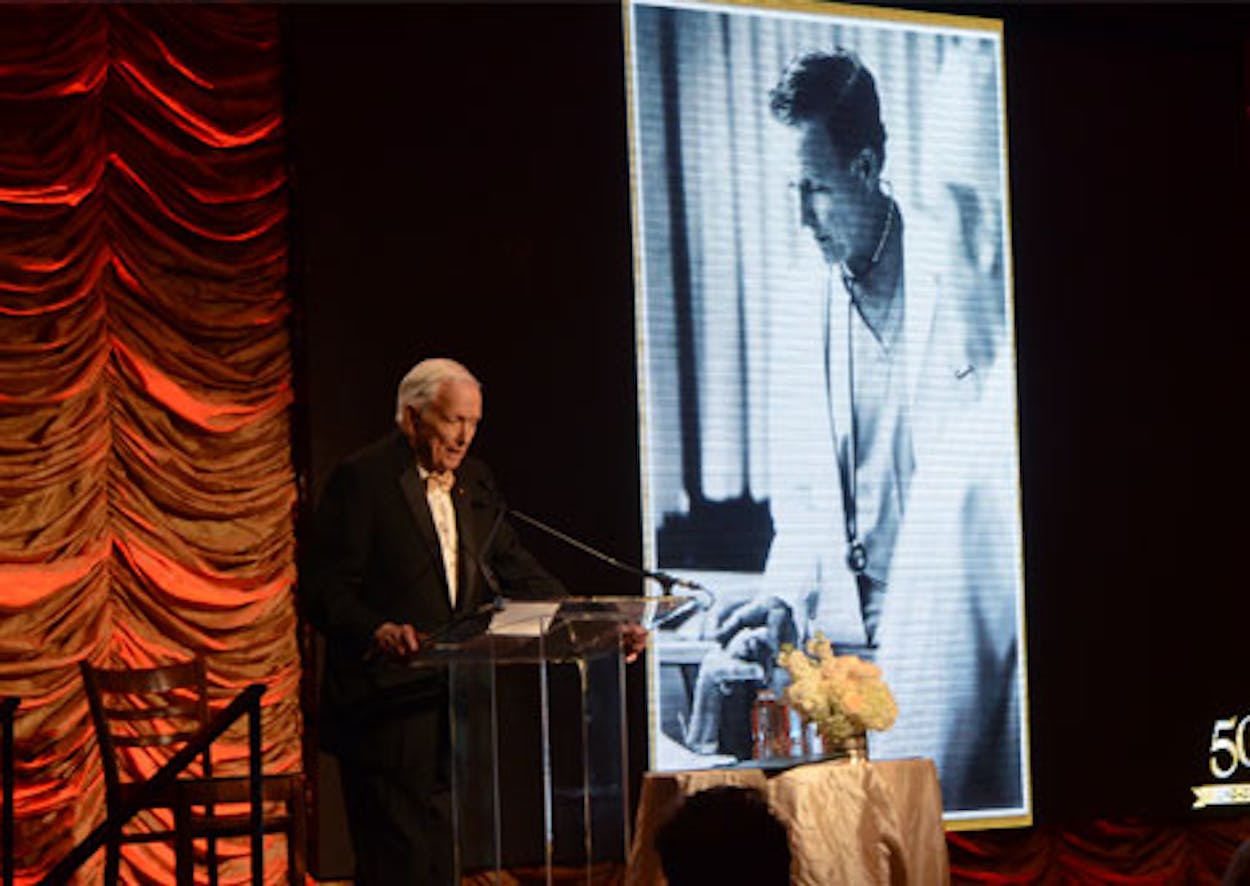Every once in a while, there are moments in Houston that provide a vivid glimpse of the city that was, that aggressively entrepreneurial, insanely individualistic and relentlessly optimistic place of legend. Such a moment was visible the night of September 18th, when the Texas Heart Institute celebrated its 50th anniversary by honoring its founder, Denton A. Cooley, whose name is almost always accompanied by the modifiers “world famous heart surgeon.”
Much time has passed since Cooley performed America’s first successful heart transplant in 1968; so, too, that period in the early seventies when Tommy Thompson wrote Hearts, the bestselling book about the titanic feud between Cooley and Michael DeBakey, his fellow world renowned surgeon, a dispute that stemmed from an accusation that the former stole that artificial heart from the latter.
But in Houston, within the two segments of the populace that know Cooley best—the medical community and old line Houston society—he remains at 93 a towering hero, not just because of what he accomplished for humankind, but because of what he did for the city’s image as a global medical mecca. Hence this valedictory lap—one that also included the publication of Cooley’s book, 100,000 Hearts: A Surgeon’s Memior, earlier this year—held in a Galleria hotel ballroom that was barely big enough for the crowd of nearly 800 well wishers.
Lyle Lovett was the surprise musical guest and there were videotaped tributes from former Presidents Bill Clinton and George W. Bush. But the evening really belonged to the kind of Houstonian rapidly disappearing from the scene, local members of the greatest generation who put the nation’s fourth largest city on the map with their smarts and with the kind of outsized personalities that could only have thrived in a place where people have always been allowed to make their own rules.
Even as a nonagenarian, Cooley remains a poster boy for this cohort, possessing all the qualities essential for membership: a distaste for conventional wisdom, a disregard of limits, a lack of pretension commensurate with a lack of fear. This was, after all, a man who fashioned an early version of the heart/lung machine from pieces cobbled together from a coffee pot. This same man once thought it was a great idea to take his colleague Christiaan Barnard—the South African surgeon who completed the world’s first heart transplant—water skiing on the San Jacinto River. And more recently when two of his Texas Heart Institute protégés, Bud Frazier and Billy Cohn, implanted the first continuous flow artificial heart in 2011, Cooley made a cameo in the patient’s room, on his scooter.
The crowd at the 50th anniversary celebration reflected that old line Houston ethos more than a stuffy Royal College of Surgeons confab or a more aggressively glitzy local event like the Houston Grand Opera ball. There were more pearls than diamonds and more men who wore cowboy boots with their tuxes as a sign of rebellion than irony.
The emcee of the event was Don Evans, the former commerce secretary, and one of the tributes came from former Secretary of State James Baker—“Jimmy” in this crowd—who, while praising Cooley’s many “firsts,” also noted that he, Baker, had “run presidential campaigns against Democrats, negotiated with the Soviets and the Chinese during the Cold War and helped force Saddam Hussein to remove his troops from Kuwait. But none of this compares with having a $1 golf bet with Denton.” Not only does Cooley hate to lose, Baker said, he hates to lose a dollar.
Cooley’s son-in-law, Charles Fraser, described meeting Cooley in 1982, as a second-year medical student and as a suitor of Cooley’s daughter Helen: “I entered the Cooley family library to find perhaps the most famous surgeon in the world, sitting in a worn out easy chair, eating his supper on a TV tray after a grueling day in the operating rooms. In another awesome display of surgical dexterity, he had in one hand the TV remote control as he shuttled between various sporting events and in the other, he wielded his fork, which he used to alternately feed himself and his close pal the family dog, Atticus Finch—from the same plate I might add.”
Cooley took it all in with the modesty of a benevolent pasha. Though frail, he still has it going on, the charm still effortless and the smile—the one that snowed everyone from scrub nurses to Princess Grace—still brilliant. His voice was soft with gratitude as he began his own speech, but took on strength as he reflected on some of his more fantastic accomplishments including the fact that he has operated on roughly 100,000 people, about the same number of folks, he noted, it takes to fill the football stadium of the University of Texas, his alma mater. Finally, Cooley displayed that forgive and remember streak so common to Houston’s most successful: After a few minor digs at DeBakey, he celebrated their famous rapprochement of 2007, which drew thunderous applause.
It was an evening of nostalgia for a younger, brasher Houston.
Later, in a phone interview, Cooley said of his earliest days: “We were in exploration mode. We didn’t have that much restriction on what we were able to do. That’s the natural process of advances, to have critics and skeptics, and they all have to be addressed.”
Yes, but on some other night.









